- Home
- James S. A. Corey
The Sins of Our Fathers Page 2
The Sins of Our Fathers Read online
Page 2
Filip ran to Jandro, more than half expecting to find him dead. Instead, he was on his knees, swatting clouds of dust off his pant legs and grinning.
“You okay?” Filip asked. “You need a medic.”
“I’m fine,” Jandro said.
“You could have been killed, coyo.”
Jandro’s grin widened, and he shrugged. The monster seemed to breathe out, some last trace of life escaping the corpse. Even dead, it was huge. Jandro bent down, grabbed the bloody pole, and tossed it back to Filip. “Thanks for the borrow, yeah? Let’s go show these pinche fuckers who’s boss.”
Jannah system was—had been—one of more than thirteen hundred connected to Sol and Laconia by the gate network. It had a middle-aged star and two planets in the goldilocks zone, four gas giants strung out into the stars with clouds of moons around them like little solar systems all their own, and a thin, disappointing asteroid belt. In the gold rush years, half a dozen different entities had put claims to the two life-sustaining worlds until a disagreement over agricultural assay rights had escalated into a brief and mutually annihilating nuclear war, and the Transport Union had been forced to step in. For the better part of a decade, the system had been fourth or sixth or tenth priority for the corporate lawyers and union administrators, rights adjudication always moving forward without ever quite resolving.
Then the Laconian Empire had rolled through, smashed through the red tape with the iron fist of imperial fiat, and Emerling-Voss Minerals and Financial Holding dusted off its blueprints.
It was more than possible that somewhere in those plans, there had been a little square with a double line hashing one side that had meant temporary barracks. Or, more likely, general-purpose room. Now, it was two-and-a-half-meter walls of prefabricated metal with yellow chips in the blue sealant and a patina that made them look dirty no matter how much Filip scrubbed them. The ceiling had the same kind of full-spectrum worklights as the cabin on his last ship, the Rhymer. And inside the building’s only room, two canvas cots. One was his. The other belonged to Mose, his supervisor. Diecisiete, the third of their three-person team, was in Alpha if she was anywhere.
“Wake up,” Mose said.
Filip turned on his cot and moaned.
“Wake up.”
“Can’t wake up,” Filip said. “I died. Dead men don’t wake up.”
“You didn’t die.”
“Then why do I hurt so much?”
“Because you didn’t die,” Mose said with a long, wheezing laugh. “Dead men don’t hurt. That’s being alive.”
“Could be in hell,” Filip said. By now, sleep had retreated, and all that was left was the ache and sense of fear.
“Could be,” Mose said, but the laughter was less now. Filip rolled onto his side, and Mose put a plate on the cloth by his shoulder. Textured protein and the last of their pepper sauce. With the state he was in, it even smelled good. He rose to sitting and took a spoonful. Mose stood, folding his wide arms.
“Now you’re done sleeping the day away, there’s work to do.”
“Be right there,” Filip replied, as if his work contract was still what it had been. As if the Rhymer was coming back to drop off the new crew and take them back up the well and out to the stars. It was a little piece of theater they played out between the two of them. Mose played at being the good boss, Filip played at being the diligent underling. He could hear in the way Mose talked that the act was wearing thin. It was wearing thin for everyone.
Between them, Alpha and Beta were the whole human population of the planet, and the majority of the people in the system. There was, Filip had heard, a prospector’s ship on one of the watery moons of the second gas giant. If that was true, whoever they were needed to get their asses back down to the planet as quickly as they could and then find a way to land. With the gate gone, the human population that mattered—that had any meaningful effect on any of them for the rest of their lives—had gone from tens of billions to under two thousand. Maybe less. If they weren’t careful, maybe a lot less.
Filip finished his breakfast, scraping out the last bits of nutritional yeast and mushroom with his fingernail. The voices of the others filtered in from outside. And behind that, the clanging of a mallet on steel. He went to check his hand terminal, but it had broken a week before and there weren’t any replacement parts. The fabrication lab could have built some, but the supply of reagents wasn’t deep, and he didn’t need a hand terminal anymore. He could just walk outside and look up to know the time of day. Or consult with the weariness in his back to know how much rest he still needed.
Of the seven worlds Filip had set foot on—all of them light gravity, two of them too heavy for him anyway—Jannah had the most changeable skies. Some days it was an indigo so dark he could see the brightest stars at midday. Others, like today, it was a pale olive from horizon to horizon. The breeze was cool and musky, like one of the old water treatment plants on Ceres. The damage to the town was different in the daylight. Better because he could see it and not just let his imagination tell him how bad it was. Worse because he couldn’t tell himself they’d gotten off light.
The monster had stumbled through a storage building and the machine shop where the science team worked on their small fleet of prospecting drones. Both of the buildings were flattened. If it had kept on the path it started, it would have gone through all the barracks, and they’d have been digging graves for half the town. Instead, the corpse lay in the plaza, its flesh cut open, swarmed by the local carrion insects and biologists. Leward paced among them, gesturing excitedly with his wide, blood-streaked hands. Filip scanned the crowds until he found Mose coordinating a salvage crew at the dead machine shop. Kofi was there too, and a broad-faced woman whose name was Aliya or Adaliya. Something like that. With the Rhymer gone, it probably made sense to pay more attention to things like that now. Filip slid over, hands in his pockets, and looked over the mess. Kofi noticed him and lifted a hand in greeting.
“Could have gone better,” Filip said, gesturing to the ruin with his chin.
“Could have gone worse too,” Mose said. “We lost some of the fine-work machines, but if we pull this up careful enough, I bet we can reuse almost all of it.”
“I’ll see if the welding rig’s free,” Maybe-Aliya said, and strode off. The patch on the back of her jumpsuit said she was maintenance. One of Jandro’s crew. Filip looked back at the dead monster and the men and women around it. The ones who were working by talking a lot.
“I see it too,” Kofi said.
“Yeah,” Filip said. “What can you do, though.”
It was natural enough. The scientists and administrators were doing science and administration. The mechanics and workers were working with machines. Filip found a length of conduit and used it to scratch the itch between his shoulder blades. Up between the light olive sun and them, something huge and distant unfolded wide, curving wings and cast them all into shadow for a second.
Mose spat on the ground. “Slug thrower got the fucker, yeah?”
Filip considered the dead monster. The autopsy had peeled it down to bright pink bone and pale flesh. It looked only a little smaller than it had in the darkness. Its flat face still had the permanent smile, like it knew a joke the primates that had killed it didn’t understand.
“Took a while.”
“Misfired the first time,” Mose said. “That’s what I was fixing before I came here. They had to ground out the main capacitor and bring the whole thing back up from battery. Overengineered and slapped together at the same time.” He spat again.
“Why we been using old-fashioned explosive propellant guns since forever,” Filip said. “They’re like sharks. We found a perfect design for killing the shit out of some coyo that needs it, why change?”
“Yeah, we used to have spaceships too.”
Spaceships and gun cartridges, both relics of their past.
“Coyo in chemistry group says we can get saltpeter from the local guano. Seems like we sh
ould try.”
“We do this first,” Mose said with his supervisor voice.
A woman broke off from the flock of administrators and scientists. She was smaller than Filip, with light brown skin and a mane of tight-curled hair that was auburn where it wasn’t gray. She’d done his intake interview when he and Mose had arrived from Alpha. Her last name was a mouthful of Russian that sounded like a puppy falling down stairs, so everyone called her Nami Veh.
“Moses. Filip.” She nodded to each of them as she said their names. She had a gift for making it feel like they were friends, and knowing everyone by name was part of it. “We’re calling a town meeting tomorrow after dinner.”
“Yeah?” Filip said.
“It’s to talk about everything we know so far about…” She looked back at the dead monster. “About those. And planning for what we do next. It’s important that everyone come.”
“We’re not really part of all this,” Mose said, shaking his head. “Me and Filipito? We’re subcontractors, not permanent here.”
Filip didn’t know if Mose was fucking with her, or if that was really still how he thought of himself. Of them. At a guess, Mose wasn’t a hundred percent sure either. Nami Veh’s smile was ready and real.
“It matters for everyone, so we want everyone to be part of it.”
Mose shrugged. “Okay. We can try. Not like we’re going to be out at the dance hall.”
Nami Veh laughed like it had been funny, put her hand on Mose’s shoulder, and moved off to some maintenance group workers who were resetting a water purifier the monster had knocked down. When she was out of earshot, Mose chuckled.
“I guess she can call ‘town meetings’ now. Think we can all do that? Go tell the science leads that there’s a thing they have to come to? Think we can all decide there’s something on the schedule, or is that just them?”
Kofi smiled, but his eyes made him look angry. “Typical, yeah? No problem inners can’t solve with more fucking meetings.”
“We don’t go,” Mose said, then turned to point at Filip particularly. “That’s the rule. If extra meetings aren’t cleared by the union, we don’t go. You give these bastards a millimeter, they’ll take a klick.”
“The union? Are you kidding?” Filip asked, and then regretted it.
Mose’s face went dark and his chin jutted forward. “You listen to me. You and me, we’re union. That’s the way it is. All this other shit doesn’t change anything unless we let it. And we are not going to fucking let it. Never. You understand?”
Kofi looked away, embarrassed. Mose wasn’t insane, but here he was shouting about getting something cleared by the union offices, as if that could happen. As if the way things used to be had anything to do with how they were now. If he’d dropped his pants and started dancing with his ass out, it would have been just as connected to their current reality.
Grief made people weird.
At the corpse, Leward was talking animatedly to a half dozen of the science team. Nami Veh was already halfway around the plaza, organizing whatever it was she was organizing. And Mose was staring at Filip with the kind of aggressive silence that could turn into a fight if he let it. Mose was ten years younger than he was, and when he looked at Filip, he just saw an old Belter technician with white in his beard and hair. He didn’t see Filip as a threat, and Filip had put a lot of effort into keeping it like that.
“I hear you,” Filip said, carefully. “We should probably get this thing salvaged, yeah?”
Mose hoisted up his chin a degree more. Filip imagined slamming the conduit in his hands into Mose’s face. The look of surprise the man would give him before he dropped. Instead, he let his own gaze fall, looking more submissive than he felt. It seemed to satisfy Mose.
“Where the hell is Adiyah?” Mose muttered, and stalked off, ready to vent at her. Filip dropped the conduit he’d been holding and started to pace off the ruins of the machine shop. Kofi fell in beside him. After a few seconds, the younger Belter spoke.
“Mose, he’s…”
“Yeah,” Filip agreed. “Lot of people shook. Strange times, que?”
“Strange times.” And then a moment later, “Are you really going to sit out this town meeting because of the union?”
“No.”
Forty years could be a long time. Or it could be hardly any time at all. Most often, it was both of those at once. Filip had taken this form of his name as a boy. The older he got, the more distance he had from his childhood, the stranger it became to him. Fifteen was the age when most people were taking their first contracts. He’d been leading terrorist raids that got people he knew and cared about killed. Watching his mother throw herself out an airlock without a vac suit. Helping his father commit genocide. Filip Inaros, he’d been then.
And he’d fallen from grace and renamed himself Nagata. He could remember when all the sins of his childhood had felt like glorious virtue, but he couldn’t get the feeling itself back. And then his father died, and the systems of law and commerce remade themselves, and he was just another face among billions. No one knew that he’d left before that final battle. The records of his desertion had been lost with the Free Navy. He was dead, and so he was free to move on with his life. That was the theory anyway. The practice was more complex.
He’d been angry, and he hadn’t understood why, not for years. Even saying it aloud—My father was a terrible man, and I helped him do terrible things—didn’t carry the weight of it. He failed out of his first apprenticeship from having too many panic attacks. And the Filip Nagata name was a thin shield. If anyone looked too closely into him, they’d see past the paint. So he took other names, other pasts. Oskar Daksan. Tyr Saint. Angél Morella. Somehow, though, he always gravitated back to Filip Nagata. His past was like a wound that wouldn’t heal. Or a poison.
Other people, they put together lives that followed from one thing to the next. Instead, he’d spent his life dodging justice that might not even have been looking for him except in his head. That had been enough to break him. At thirty-one years old, he had been Tyr Saint for a year and a half, an unofficial part of a group marriage on a Transport Union colony ship, and in line for the chief mechanic’s place when she retired. For no reason he could fathom, he’d woken up one morning with an abyss of fear opening under him. He’d murdered billions. He’d seen his own friends die. They, whoever “they” were, would come for him. He’d dropped his identity at the next port and vanished, starting over again from nothing. Never letting anything build.
He took the work nobody wanted. Low pay, high risk, long contract. He signed onto the ships where people didn’t talk about their pasts. He avoided any conversation about Marco Inaros or the Free Navy or the bombardment of Earth. And if anything ever went right for him, if he ever seemed in danger of gaining something he might be able to keep, he ran.
Once, he’d tried reading about the experience of child soldiers and the paths they’d taken through the trauma of their adult lives. Before he’d even finished the first half of the book, he’d descended into panic so deep that the ship medic had put him on antiseizure medications. He’d never tried again.
Forty years could go fast that way. They could feel like a thousand.
The Rhymer was the latest in a long string. Filip Nagata had never dropped out long enough to lose his place in the union, but his work history had long and inexplicable gaps in it. There were a million work histories like it. Mental illness. Addiction. Religious or romantic fixation. Families made and left behind. There were a thousand reasons for moth-eaten careers like his. And there were slots on a ship like the Rhymer for people like him. The ship’s full name was Thomas the Rhymer, and it was owned by a trade organization out of Bara Gaon that catered to new and struggling colonies. For the first few years, he’d been on strictly as crew as they carried workgroups through half a dozen gates, dropped off people and equipment or picked them up again to transfer off to other ships, other systems. When Laconia rolled through, the Rhymer and her sis
ter ships had gone from working for the Transport Union to the Association of Worlds without missing a beat. It didn’t matter who was in power, they wanted someone doing the shit work that the Rhymer made possible.
Filip had been happy there, or at least not unhappy. He’d have kept his slot if two things hadn’t happened. First, the XO had taken an inexplicable dislike to him. And second, the junior technician in Mose’s workgroup had a heart attack three weeks after they’d passed through Jannah gate. The company needed a replacement, and pulling from the Rhymer’s crew meant not having to spend the extra transit time. Filip needed off the ship at least until the XO calmed down or shifted his paranoia elsewhere, and the gravity of the little planet was light enough that Filip could stand it without risking circulatory collapse.
It had seemed like a good choice for everyone, and him most of all.
He and Mose and Diecisiete had delivered a solar power array to Alpha and spent a few months setting it up, troubleshooting it, and helping the locals work out the bugs. Diecisiete had stayed in Alpha to track down a power drop, while Filip and Mose rode a supply shuttle to Beta and started the whole damn thing again. Filip could still picture the shuttle leaving them there, heading back to the relative metropolis of Alpha. There was a strange calm that had come from being at the edge of civilization. Or maybe just past the edge.
The news of the rest of the systems, the attack on Laconia, the loss of Medina Station, the eerie losses of consciousness that turned off minds everywhere, including Jannah, were all things that had happened during his time in Alpha. And the other, stranger thing. The timeless stretch when all minds had smeared together like oil paints being mixed by a gigantic, uncaring thumb had come when he and Mose had reached Beta. Filip’s memory of that period was spotty and odd. Like he was trying to recall the details of a dream too big to fit in his finite skull.

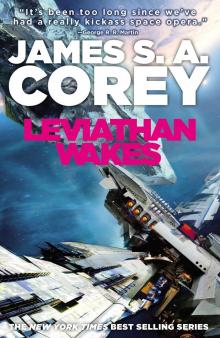 Leviathan Wakes
Leviathan Wakes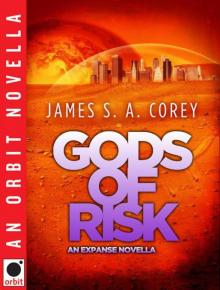 Gods of Risk
Gods of Risk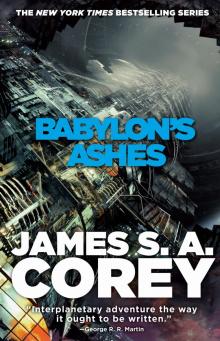 Babylon's Ashes
Babylon's Ashes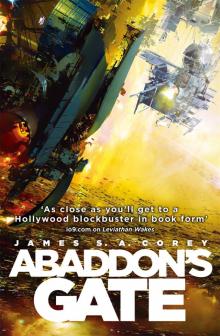 Expanse 03 - Abaddon’s Gate
Expanse 03 - Abaddon’s Gate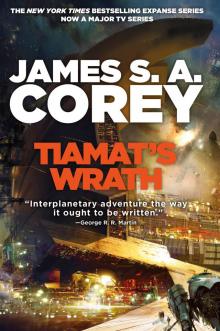 Tiamat's Wrath
Tiamat's Wrath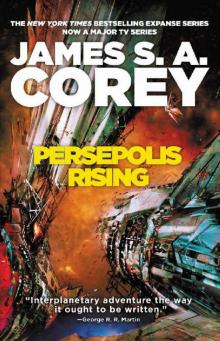 Persepolis Rising
Persepolis Rising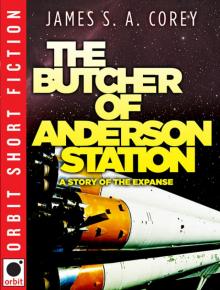 The Butcher of Anderson Station
The Butcher of Anderson Station The Churn
The Churn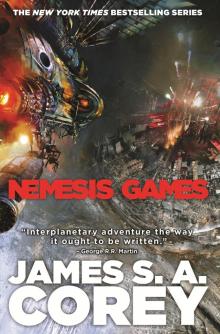 Expanse 05 - Nemesis Games
Expanse 05 - Nemesis Games Strange Dogs
Strange Dogs Honor Among Thieves: Star Wars
Honor Among Thieves: Star Wars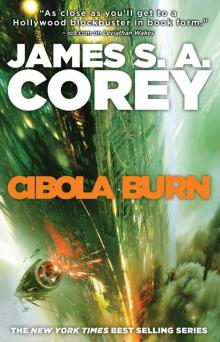 Cibola Burn
Cibola Burn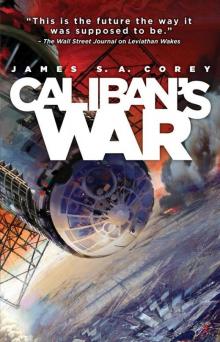 Caliban's War
Caliban's War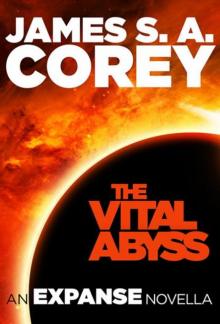 The Vital Abyss
The Vital Abyss Auberon
Auberon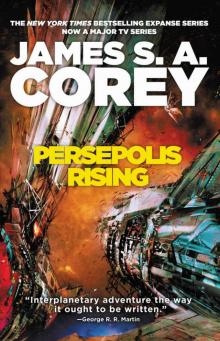 Persepolis Rising (The Expanse)
Persepolis Rising (The Expanse)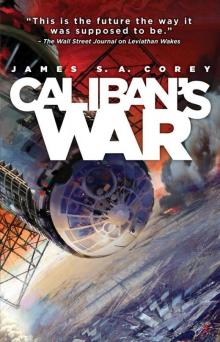 Caliban's War: Book Two of the Expanse series
Caliban's War: Book Two of the Expanse series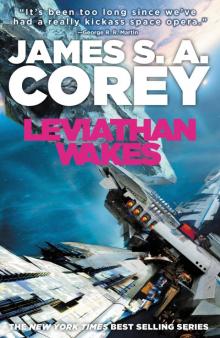 Leviathan Wakes: Book One of The Expanse
Leviathan Wakes: Book One of The Expanse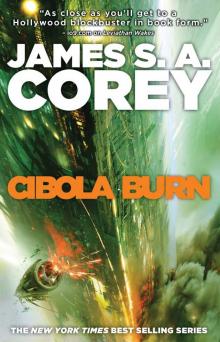 Cibola Burn (Expanse)
Cibola Burn (Expanse) Strange Dogs (Expanse)
Strange Dogs (Expanse)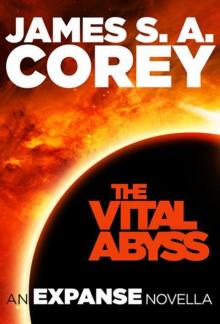 The Vital Abyss: An Expanse Novella (The Expanse)
The Vital Abyss: An Expanse Novella (The Expanse)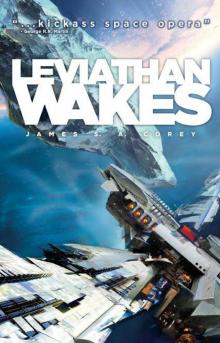 Leviathan Wakes e-1
Leviathan Wakes e-1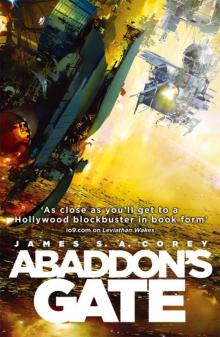 Abaddon's Gate e-3
Abaddon's Gate e-3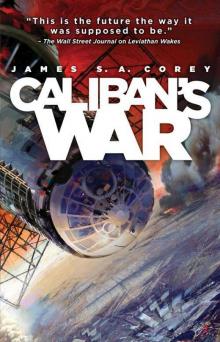 Caliban;s war e-2
Caliban;s war e-2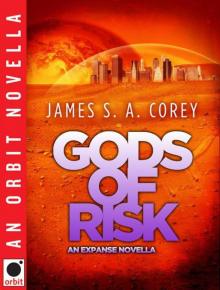 Gods of Risk: An Expanse Novella
Gods of Risk: An Expanse Novella Honor Among Thieves: Star Wars (Empire and Rebellion)
Honor Among Thieves: Star Wars (Empire and Rebellion)